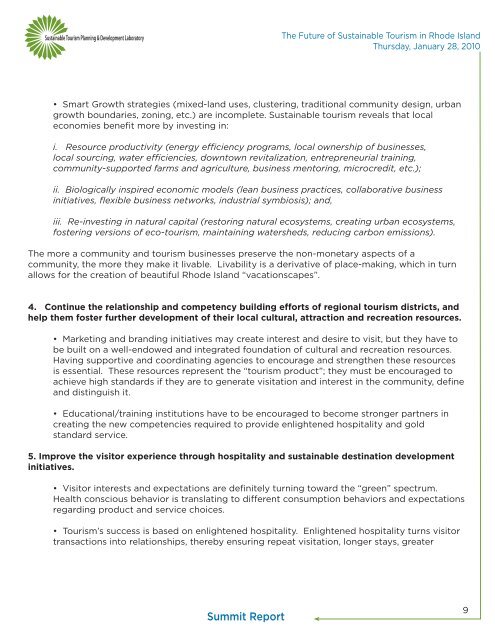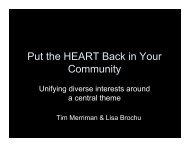Download PDF - Sustainable Tourism Lab
Download PDF - Sustainable Tourism Lab
Download PDF - Sustainable Tourism Lab
You also want an ePaper? Increase the reach of your titles
YUMPU automatically turns print PDFs into web optimized ePapers that Google loves.
The Future of <strong>Sustainable</strong> <strong>Tourism</strong> in Rhode Island<br />
Thursday, January 28, 2010<br />
• Smart Growth strategies (mixed-land uses, clustering, traditional community design, urban<br />
growth boundaries, zoning, etc.) are incomplete. <strong>Sustainable</strong> tourism reveals that local<br />
economies benefit more by investing in:<br />
i. Resource productivity (energy efficiency programs, local ownership of businesses,<br />
local sourcing, water efficiencies, downtown revitalization, entrepreneurial training,<br />
community-supported farms and agriculture, business mentoring, microcredit, etc.);<br />
ii. Biologically inspired economic models (lean business practices, collaborative business<br />
initiatives, flexible business networks, industrial symbiosis); and,<br />
iii. Re-investing in natural capital (restoring natural ecosystems, creating urban ecosystems,<br />
fostering versions of eco-tourism, maintaining watersheds, reducing carbon emissions).<br />
The more a community and tourism businesses preserve the non-monetary aspects of a<br />
community, the more they make it livable. Livability is a derivative of place-making, which in turn<br />
allows for the creation of beautiful Rhode Island “vacationscapes”.<br />
4. Continue the relationship and competency building efforts of regional tourism districts, and<br />
help them foster further development of their local cultural, attraction and recreation resources.<br />
• Marketing and branding initiatives may create interest and desire to visit, but they have to<br />
be built on a well-endowed and integrated foundation of cultural and recreation resources.<br />
Having supportive and coordinating agencies to encourage and strengthen these resources<br />
is essential. These resources represent the “tourism product”; they must be encouraged to<br />
achieve high standards if they are to generate visitation and interest in the community, define<br />
and distinguish it.<br />
• Educational/training institutions have to be encouraged to become stronger partners in<br />
creating the new competencies required to provide enlightened hospitality and gold<br />
standard service.<br />
5. Improve the visitor experience through hospitality and sustainable destination development<br />
initiatives.<br />
• Visitor interests and expectations are definitely turning toward the “green” spectrum.<br />
Health conscious behavior is translating to different consumption behaviors and expectations<br />
regarding product and service choices.<br />
• <strong>Tourism</strong>’s success is based on enlightened hospitality. Enlightened hospitality turns visitor<br />
transactions into relationships, thereby ensuring repeat visitation, longer stays, greater<br />
Summit Report<br />
9





